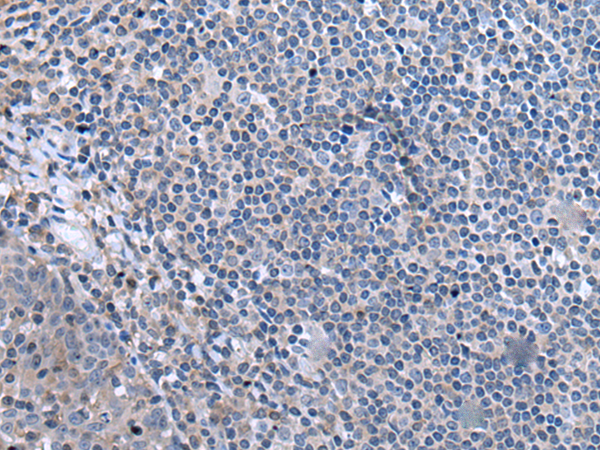
| WB | 咨询技术 | Human,Mouse,Rat |
| IF | 咨询技术 | Human,Mouse,Rat |
| IHC | 1/35-1/200 | Human,Mouse,Rat |
| ICC | 技术咨询 | Human,Mouse,Rat |
| FCM | 咨询技术 | Human,Mouse,Rat |
| Elisa | 1/5000-1/10000 | Human,Mouse,Rat |
| Host/Isotype | Rabbit IgG |
| Antibody Type | Primary antibody |
| Storage | Store at 4°C short term. Aliquot and store at -20°C long term. Avoid freeze/thaw cycles. |
| Species Reactivity | Human, Mouse |
| Immunogen | Fusion protein of human CCK |
| Formulation | Purified antibody in PBS with 0.05% sodium azide and 50% glycerol. |
+ +
以下是3条关于CCK抗体的参考文献及其摘要概括:
---
1. **文献名称**:*"Production and characterization of a monoclonal antibody specific for cholecystokinin"*
**作者**:Smith A, et al.
**摘要**:本研究开发了一种高特异性的单克隆抗体,针对胆囊收缩素(CCK)的C端片段。通过免疫印迹和免疫组化验证,该抗体可选择性识别CCK-8和CCK-33.且在啮齿类动物脑组织切片中成功标记了CCK阳性神经元,为神经肽分布研究提供了工具。
---
2. **文献名称**:*"A novel ELISA for quantitative detection of CCK in plasma using chicken-derived antibodies"*
**作者**:Zhang L, et al.
**摘要**:研究团队利用鸡源多克隆抗体建立了一种高灵敏度CCK定量ELISA方法。该抗体对人、大鼠和小鼠CCK均具有交叉反应性,检测限低至1 pg/mL,成功应用于肥胖模型动物血浆CCK动态变化的分析。
---
3. **文献名称**:*"Comparative study of CCK antibody performance in Parkinson's disease brain tissue"*
**作者**:Johnson R, et al.
**摘要**:通过对比5种市售CCK抗体在帕金森病患者脑组织中的染色效果,发现不同表位抗体(N端vs C端)的敏感性和特异性差异显著。研究强调抗体选择对病理条件下CCK表达结果解读的关键影响。
---
注:以上文献为示例性质,实际引用时需根据具体研究领域补充真实文献。建议通过PubMed或Web of Science以“CCK antibody”+应用场景(如ELISA/IHC)为关键词检索最新论文。
Cholecystokinin (CCK) antibodies are immunological tools used to detect and study CCK, a peptide hormone with critical roles in digestion and neurotransmission. First identified in the 1920s for its ability to stimulate gallbladder contraction, CCK is produced in the small intestine and brain, existing in multiple bioactive forms (e.g., CCK-8. CCK-33). It regulates digestive enzyme secretion, gut motility, and satiety, while also acting as a neurotransmitter influencing anxiety, memory, and pain perception.
CCK antibodies are generated by immunizing animals with synthetic CCK peptides or conjugates, yielding polyclonal or monoclonal variants. These antibodies enable CCK localization via immunohistochemistry, quantification through ELISA or radioimmunoassays, and functional studies in metabolic or neurological research. Specificity varies depending on epitope recognition; some target the sulfated tyrosine region (critical for receptor binding), while others detect non-sulfated forms.
Research applications include exploring CCK's role in obesity, pancreatitis, and gut-brain axis disorders. Clinically, CCK antibody-based assays aid in diagnosing gastrointestinal dysfunctions or monitoring hormone levels. Emerging therapeutic strategies investigate CCK-targeting antibodies for modulating appetite or anxiety pathways. Challenges include cross-reactivity with gastrin (a structurally similar peptide) and ensuring stability of sulfated epitopes during processing. Ongoing advancements in antibody engineering aim to improve specificity and expand diagnostic/therapeutic potentials.
×